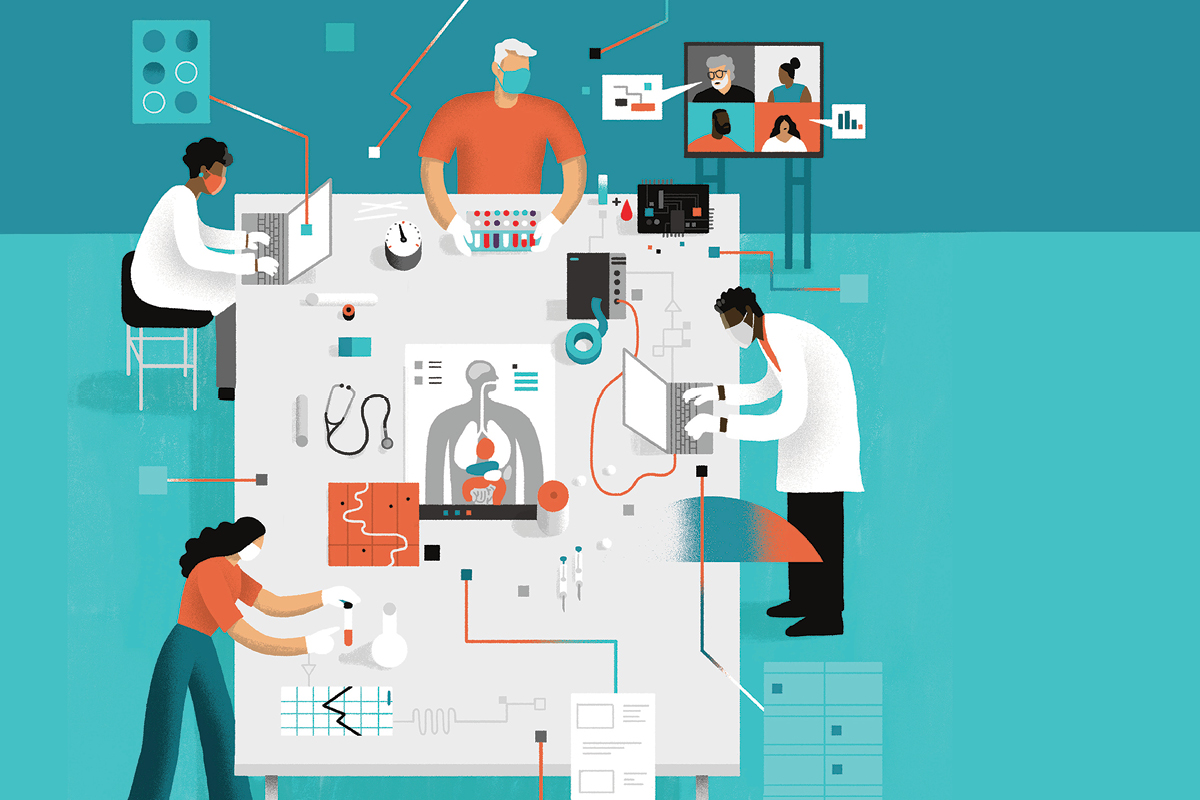The Future of Epidemiology
How a new center at Rollins is innovating, collaborating, and preparing public health practitioners to face the next pandemic.

The Center for Infectious Disease Modeling and Analytics and Training Hub (CIDMATH) is the culmination of years of collaborative, cross-campus work in infectious disease. At least, that’s what Natalie Dean, PhD, associate professor of biostatistics and bioinformatics and CIDMATH co-principal investigator, would say.
“For the past few years with the Emory Alliance for Vaccine Epidemiology, we have been connecting with different parts of campus, like the Emory Vaccine Center, the Hope Clinic, and Children’s Healthcare of Atlanta ,” Dean says. “The overlap is very high between who is working in vaccine epidemiology, infectious disease modeling, and outbreak response. So when the funding opportunity for CIDMATH came up, we were ready, and we went for it.”
The goal of CIDMATH is to increase the capacity of public health researchers and practitioners to respond to future disease outbreaks using analytical epidemiology and infectious disease modeling methods. It is one of 13 such centers across the United States established through funding from the Center for Forecasting and Outbreak Analytics at the Centers for Disease Control and Prevention, creating a nationwide network called Insight Net. CIDMATH is an innovation center within that network.
“We are developing new methods, testing them out in the real world, and providing advanced training for the next generation of mathematical modelers and infectious disease epidemiologists,” says CIDMATH Director Ben Lopman, PhD, professor of epidemiology.

Natalie Dean, PhD, associate professor of biostatistics and bioinformatics and CIDMATH co-principal investigator
Outbreak Innovations
The COVID-19 pandemic taught infectious disease researchers that there is room for improvement and innovation when it comes to modeling the spread of disease. Human behavior, a critically important variable in infectious disease transmission, is one area where data and models are currently lacking.
“In the first year of the pandemic, before we had vaccines, all we could do was restrict people’s movements, encourage social distancing and masking, and focus on behavior,” Lopman says. “We found that we actually have very poor data on human behavior, and models that forecast how well certain interventions would work are reliant on that behavioral data.”

Ben Lopman, PhD, professor of epidemiology and CIDMATH Director
Another pandemic-era breakthrough was using wastewater to monitor diseases in municipal water systems across the country. CIDMATH investigators like Marlene Wolfe, PhD, assistant professor of environmental health, are on the cutting edge of wastewater surveillance. Wolfe’s Wastewater SCAN project has played a pivotal role in monitoring the spread of COVID-19, mpox, and, more recently, avian influenza.
As the center and its faculty continue to innovate, it is a priority to always stay grounded in practicality.
“One of the key principles of our center is that anything that we are developing, no matter how sophisticated, advanced, or innovative, needs to be practical,” Lopman says. “These advances need to be things that our state and local health departments can implement and use to help them make decisions and respond to outbreaks.”
Fostering Collaborative Partnerships
Partnerships—both on and off Emory’s campus—are an integral component of CIDMATH. Within the university, collaborators come together from departments across Rollins, the School of Medicine, and the College of Arts and Sciences. One of the co-principal investigators, for example, is Katia Koelle, PhD, professor in the Department of Biology. Outside of Emory, one of the center’s main partners is the Georgia Department of Public Health (DPH). As the director of research and practice relations with DPH, Allison Chamberlain, PhD, has been key in fostering that connection.
“We are working closely with DPH to understand from their perspective what their learning needs are with respect to infectious disease modeling and forecasting, and how we can best fill those with certain types of training and personnel that we could provide to them,” says Chamberlain, research associate professor of epidemiology and CIDMATH co-principal investigator.
To that end, representatives from DPH and CIDMATH have formed a steering committee to guide their work. They meet quarterly to discuss progress and plans for joint projects. One such collaboration is the Rollins Epidemiology Fellowship, which places early-career, master’s-level public health practitioners for two-year terms in health departments across Georgia.
This year, for the first time in its five-year history, the Rollins Epidemiology Fellowship program placed three outbreak analytics fellows, a position made possible through CIDMATH funding. The fellows began their terms in July 2024. They participated in training to extend their knowledge of infectious disease modeling methods before entering placements at DPH; the Macon-Bibb County Health Department; and the Gwinnett, Newton, and Rockdale County Health Departments.

Allison Chamberlain, PhD, research associate professor of epidemiology
Training the Next Generation
Opportunities for education and training abound in CIDMATH for graduate students, post-doctoral researchers, and public health practitioners. Current Rollins students, for example, can attend workshops and journal clubs with CIDMATH faculty and participate in programs like the Student Outbreak Response Team led by Chamberlain.
“We want to increase the skills that our Rollins graduate students and postdocs have in infectious disease modeling,” Dean says. “But we also want to make sure that people who are already out working as practitioners have a chance to increase and modernize their analytical skill set.”
In July 2024, Rollins hosted the Summer Institute in Statistics and Modeling in Infectious Diseases (SISMID) for the first time, bringing together more than 250 infectious disease researchers from across the country to hone their skills in statistical analysis and mathematical modeling.
“SISMID fills an interesting niche where it provides the type of training in infectious disease modeling and analytics that you really can’t get while in graduate school,” Dean says. “CIDMATH has allowed us to have this program at a large scale and has given us sustainability.”
CIDMATH also connected with current practitioners at the 94th Annual Meeting and Conference for the Georgia Public Health Association (GPHA) in May 2024. There, they kicked off a series of workshops on public health informatics and data visualization. This workshop series is an opportunity to not only train epidemiologists working in the field but also to learn more about what their needs are.
“By collaborating with GPHA, we are able to understand where the bulk of practitioners—meaning district epidemiologists, state epidemiologists, informaticists, and others in similar roles—are in terms of their skills,” Chamberlain says. “We can meet them where they are right now, and then start building on that and extending their knowledge into some of the things that we as academics know and love to use in the infectious disease modeling and forecasting space.”





